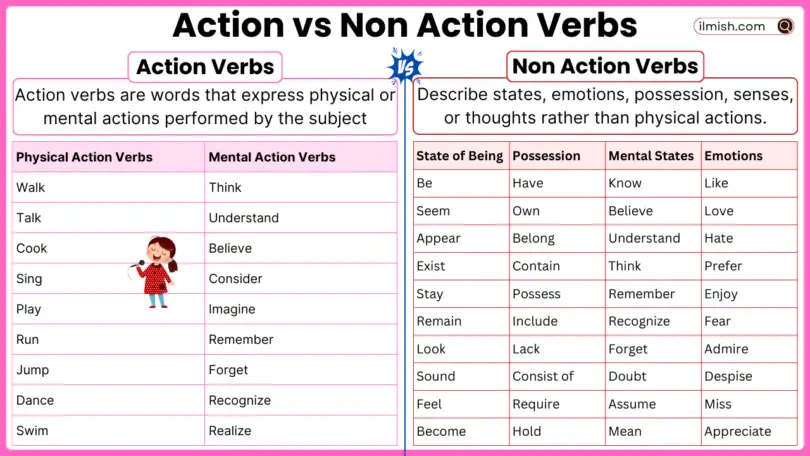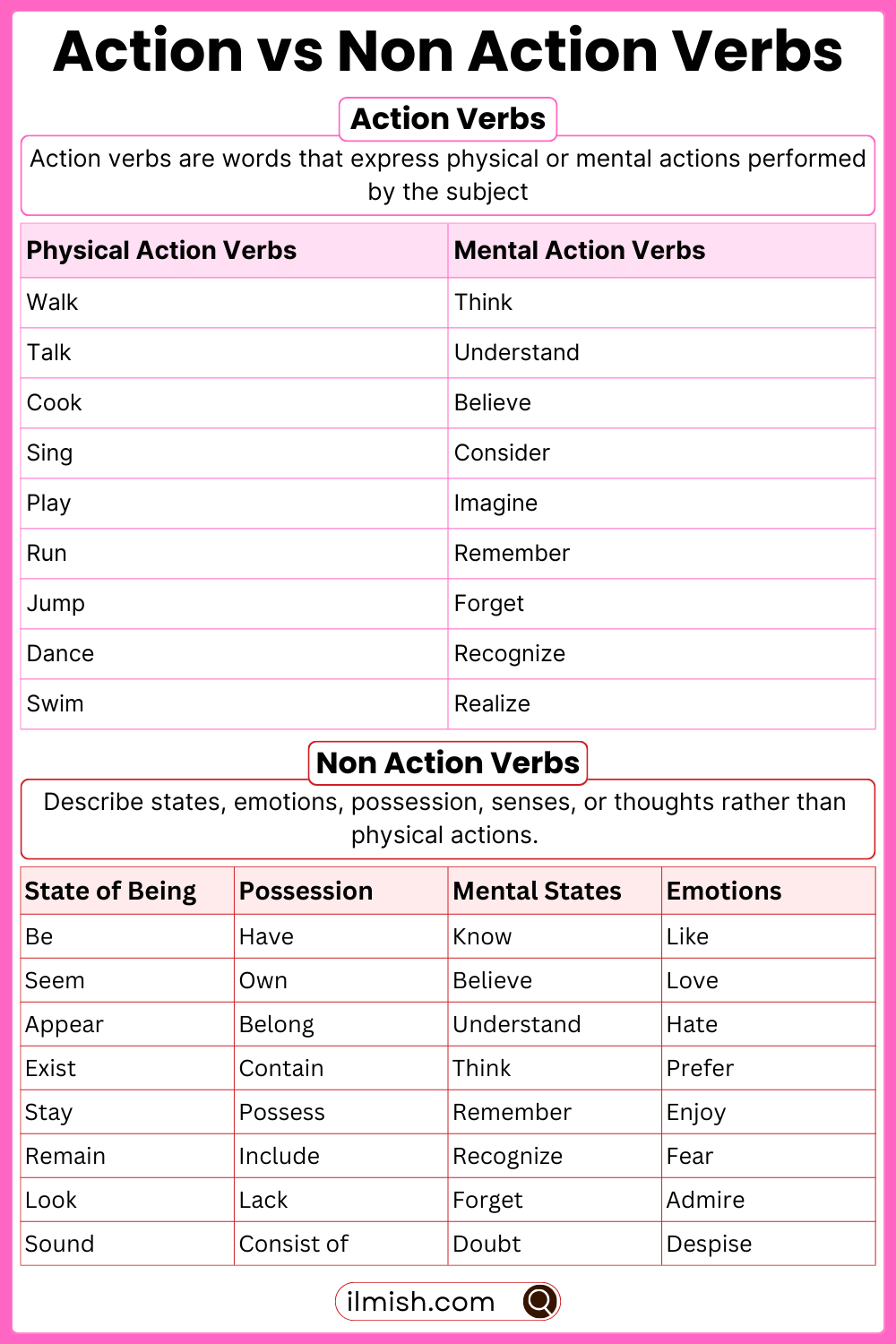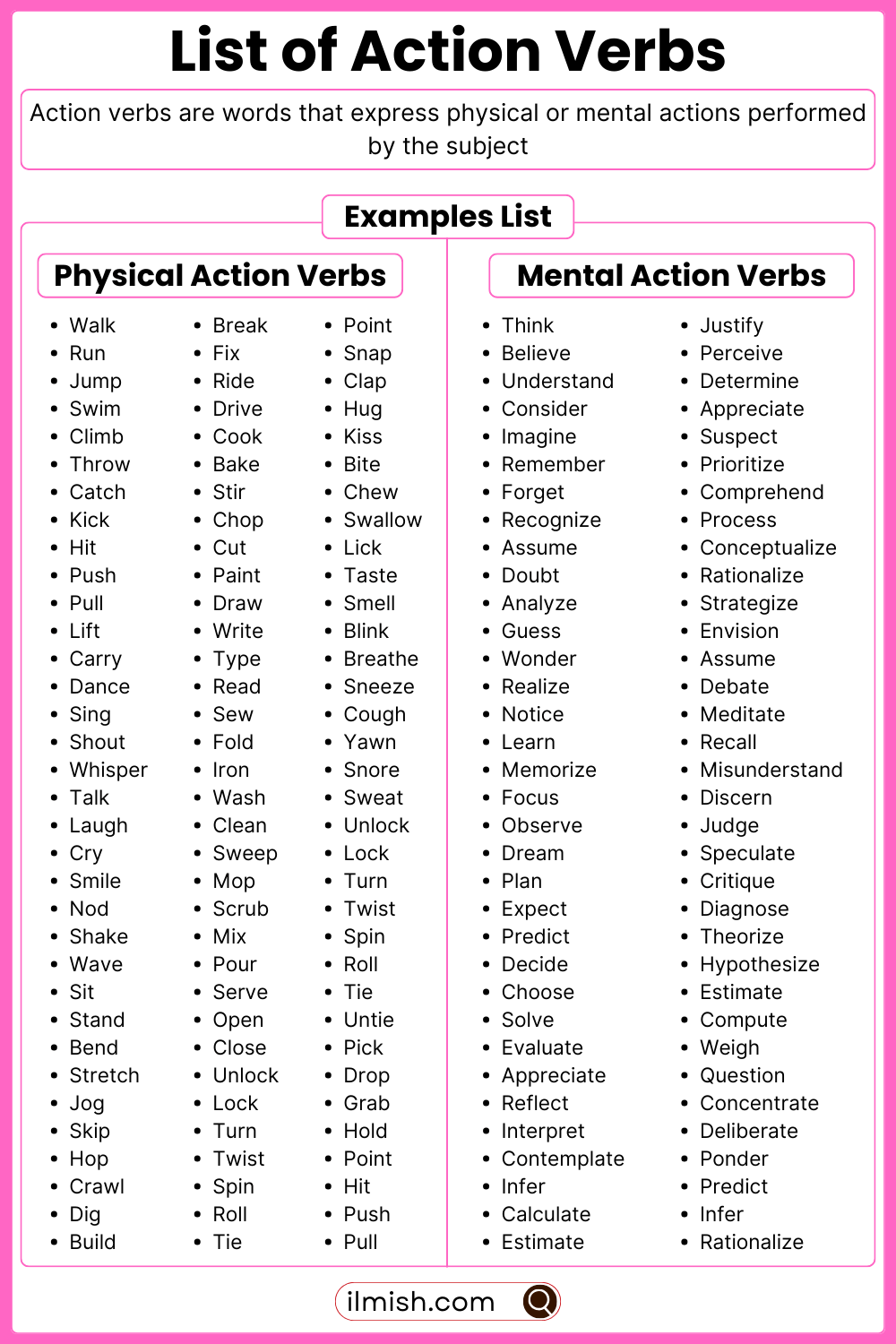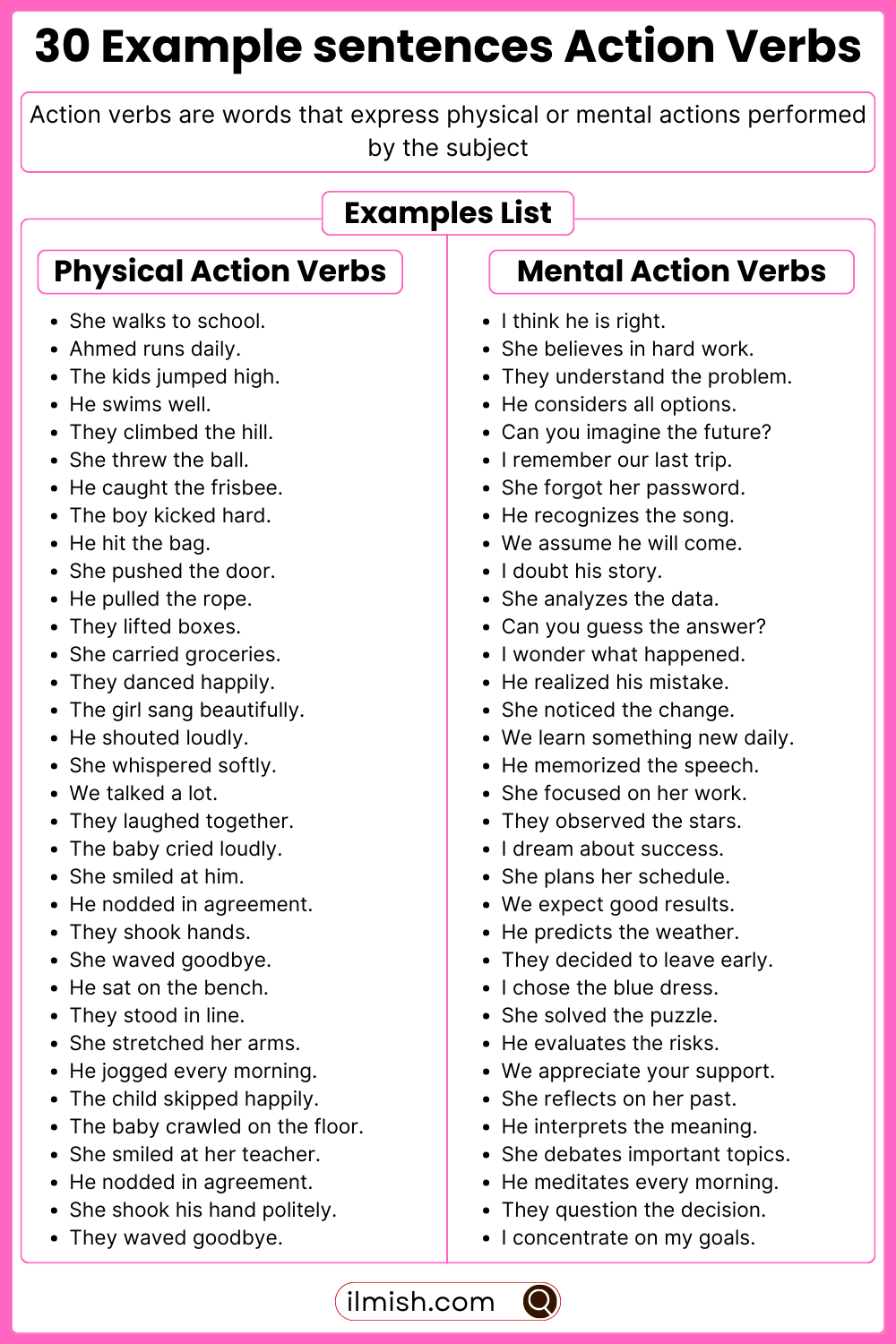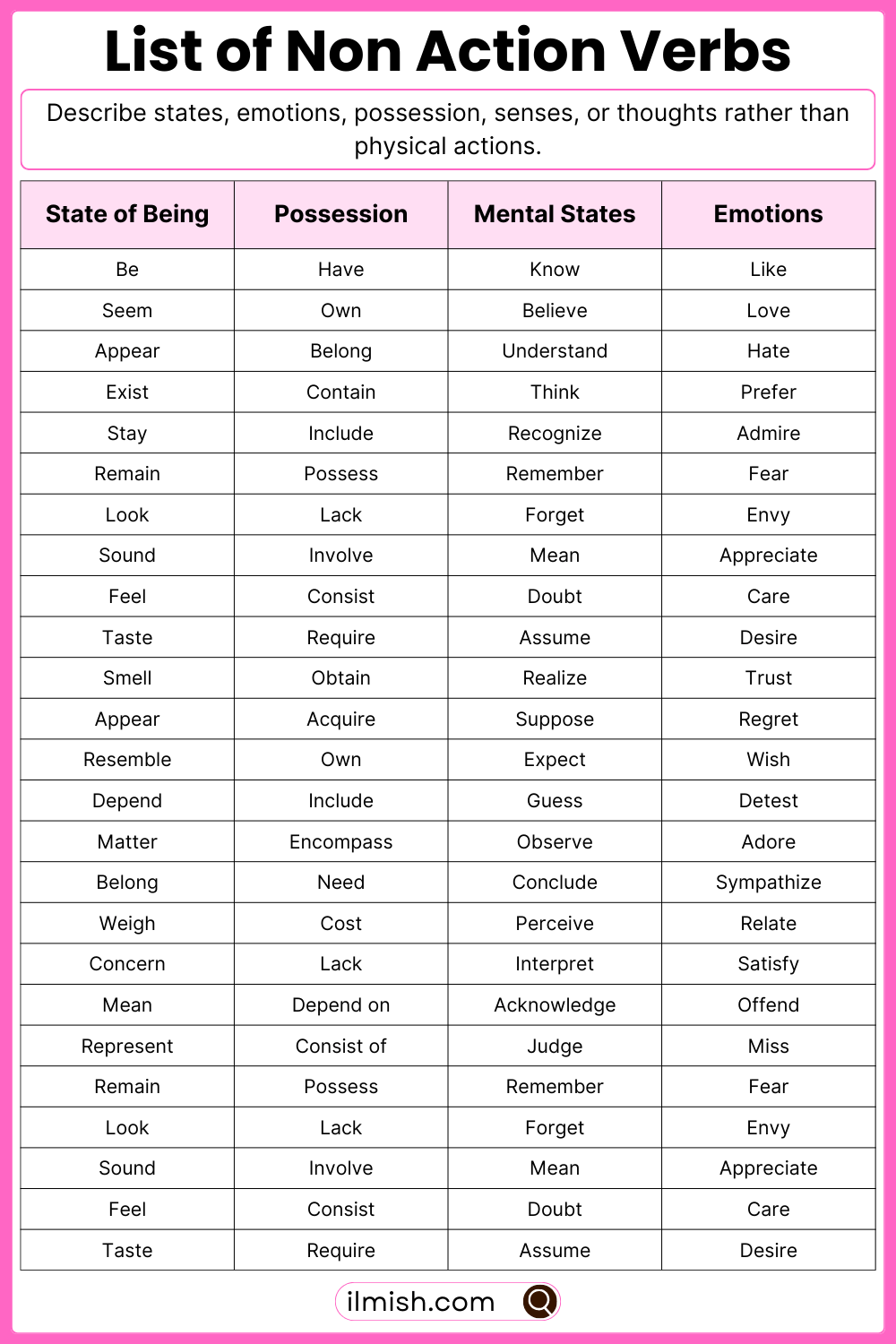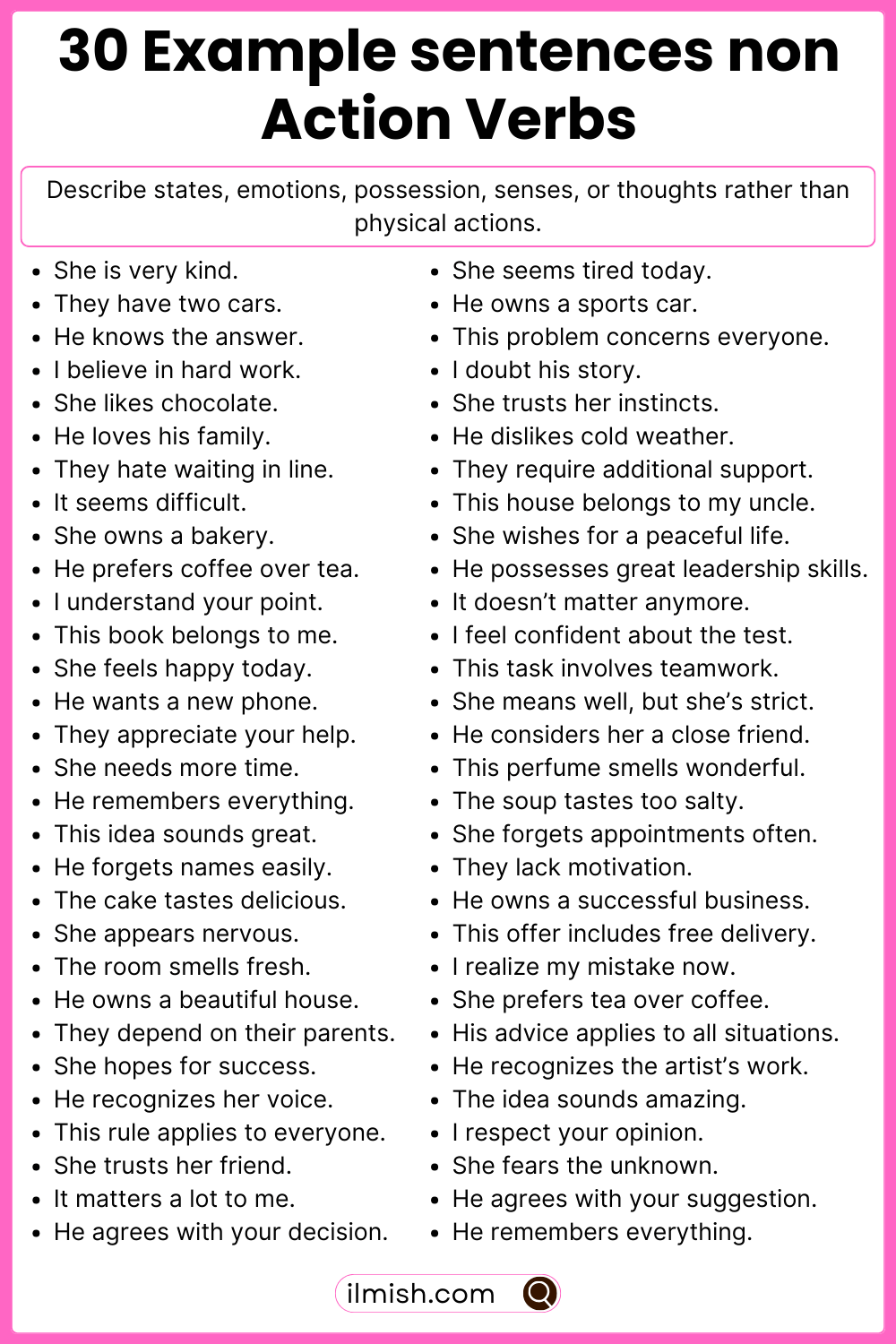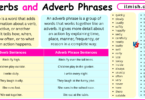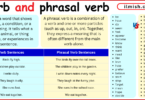What Are Action Verbs?
Action verbs describe an activity or something that a subject does. They show actions or events that can be observed or measured. These verbs answer the question What is the subject doing?
Examples of Action Verbs:
- Run – She runs every morning.
- Eat – I eat breakfast at 7 AM.
- Write – They write emails every day.
- Jump – The cat jumps over the fence.
As you can see from these examples, action verbs express physical or mental activities. They represent things you can do or perform, like eating, running, thinking, or working.
Types of Action Verbs:
- Physical Action Verbs: These verbs show activities that involve physical movement, like run, walk, jump, or dance.
- Mental Action Verbs: These verbs describe thoughts or processes happening in the mind, such as think, remember, decide, or learn.
Common Action Verbs List:
| Physical Action Verbs | Mental Action Verbs |
|---|---|
| Walk | Think |
| Talk | Understand |
| Cook | Believe |
| Sing | Consider |
| Play | Imagine |
What Are Non-Action Verbs?
Non-action verbs, on the other hand, do not describe physical actions. Instead, they refer to states, feelings, or conditions. These verbs show what something is, has, or feels rather than what it does. Non-action verbs are also known as stative verbs because they describe a state of being or a state of mind.
Examples of Non-Action Verbs:
- Be – She is happy.
- Have – They have two children.
- Know – He knows the answer.
- Like – I like chocolate cake.
Key Characteristics of Non-Action Verbs:
- State of Being: Verbs like is, are, am, was, were describe a state of existence or being. For example, “She is a teacher.”
- Possession: The verb have is used to show ownership, like in “They have a new car.”
- Mental States: Verbs like believe, know, understand describe states of mind or knowledge.
- Emotions: Verbs such as like, love, hate, prefer express feelings.
Common Non-Action Verbs List:
| State of Being | Possession | Mental States | Emotions |
|---|---|---|---|
| Be | Have | Know | Like |
| Seem | Own | Believe | Love |
| Appear | Belong | Understand | Hate |
| Exist | Contain | Think | Prefer |
Action Verbs vs Non-Action Verbs: Key Differences
| Aspect | Action Verbs | Non-Action Verbs |
|---|---|---|
| Definition | Verbs that describe physical or mental actions. | Verbs that describe a state, condition, or existence. |
| Example Sentences | She runs every day. | She is tired. |
| Verb Usage | Can be used in continuous (progressive) tenses. | Typically not used in continuous tenses. |
| Questions They Answer | What is the subject doing? | What is the subject’s state or condition? |
| Can You Use in Progressive Tense? | Yes (e.g., “He is running.”) | No (e.g., “She is knowing.”) — incorrect. |
When to Use Action Verbs in Sentences
Action verbs are used when we talk about something happening at a particular moment, or something the subject is doing actively. You can use action verbs in the present, past, or future tenses. Moreover, they are often used with the progressive tense (i.e., the “ing” form) to show ongoing actions.
List of Action Verbs
- Write
- Drink
- Read
- Play
- Eat
- Run
- Open
- Cook
- Drive
- Jumping
- Singing
- Help
- Walk
- Close
- Buy
- Carry
- Talk
- Watch
- Painting
- Throw
- Cut
- Dance
- Study
- Fix
- Cleaning
- Hold
- Build
- Laugh
30 Example sentences Action Verbs
| # | Sentence |
|---|---|
| 1 | I write a letter. |
| 2 | She drinks hot coffee. |
| 3 | He reads a book. |
| 4 | They play football outside. |
| 5 | We eat lunch together. |
| 6 | You run every morning. |
| 7 | I open the door. |
| 8 | She cooks delicious food. |
| 9 | He drives very fast. |
| 10 | They jump over the fence. |
| 11 | She sings beautifully. |
| 12 | He helps his friend. |
| 13 | We Walk to school. |
| 14 | She closes the window. |
| 15 | He buys fresh fruits. |
| 16 | I carry a heavy bag. |
| 17 | They talk about work. |
| 18 | We watch a funny movie. |
| 19 | She paints a picture. |
| 20 | He throws the ball. |
| 21 | I cut the paper. |
| 22 | She drives carefully. |
| 23 | They dance at the party. |
| 24 | We study every night. |
| 25 | He fixes the car. |
| 26 | She cleans her room. |
| 27 | I hold a pencil. |
| 28 | He builds a house. |
| 29 | They jump with joy. |
| 30 | We laugh together. |
When to Use Non-Action Verbs in Sentences
Non-action verbs are used to describe a state of being, possession, or condition. These verbs are not used in the continuous tenses (except for be, which can sometimes be used in continuous forms). For example, we wouldn’t say, “I am knowing the answer”—that would be incorrect.
List of Non-Action Verbs
- Be
- Like
- Know
- Understand
- Believe
- Love
- Hate
- Remember
- Forget
- Think
- Want
- Need
- Prefer
- Own
- Belong
- Mean
- Seem
- Sound
- Look
- Taste
- Smell
- Hear
- Recognize
- Appear
- Consider
- Feel
- Hope
- Trust
- Wish
30 Example sentences non Action Verbs
| # | Sentence |
|---|---|
| 1 | I know the answer. |
| 2 | She likes this movie. |
| 3 | He believes in hard work. |
| 4 | They need more time. |
| 5 | We prefer tea over coffee. |
| 6 | You understand my problem. |
| 7 | I see the mountains. |
| 8 | She hates cold weather. |
| 9 | He remembers everything. |
| 10 | They love this place. |
| 11 | She owns a red car. |
| 12 | He wants more money. |
| 13 | We belong here. |
| 14 | She seems happy today. |
| 15 | He has a new phone. |
| 16 | I hear loud music. |
| 17 | She appears nervous. |
| 18 | He feels tired now. |
| 19 | They agree with you. |
| 20 | We trust our teacher. |
| 21 | I hope for the best. |
| 22 | He doubts your story. |
| 23 | She owns this house. |
| 24 | They deserve respect. |
| 25 | He forgets my name. |
| 26 | We recognize his voice. |
| 27 | You sound tired. |
| 28 | She remembers the old days. |
| 29 | He needs more help. |
| 30 | They appreciate your effort. |
Learn more helpful articles

